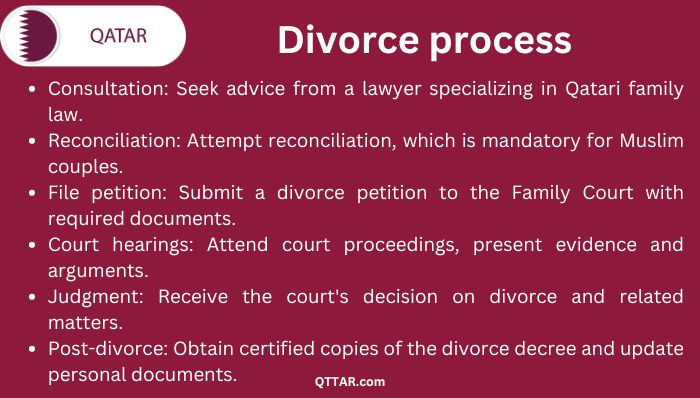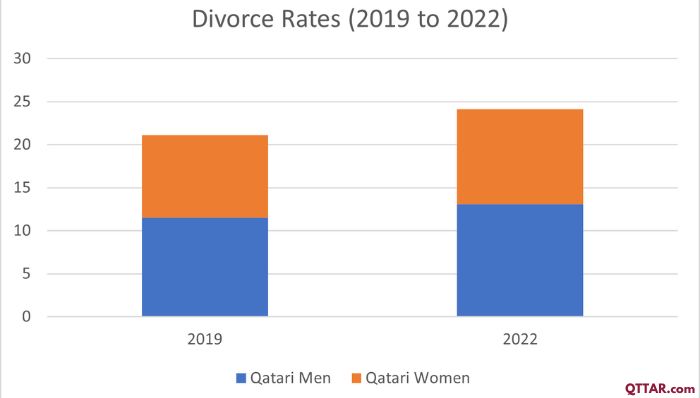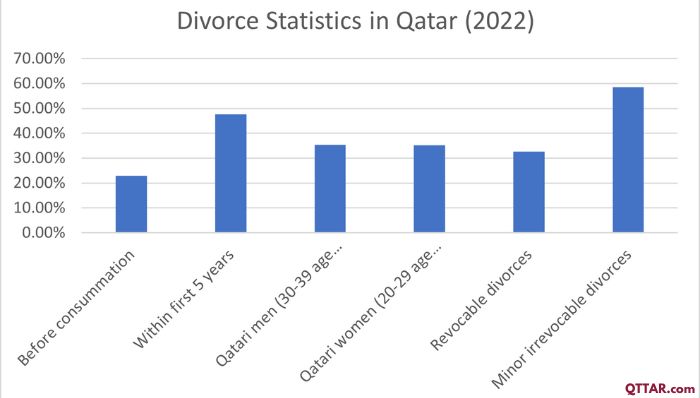How To Get Divorce In Qatar? Laws and Procedure
Divorce in Qatar is governed by Family Law No. 22 of 2006, which is based on Islamic Sharia principles. The process can be complex, especially for expatriates, and involves several legal considerations.
This complete guide will walk you through the entire process of obtaining a divorce in Qatar.
Legal Framework for Divorce in Qatar
Qatar’s Family Law No. 22 of 2006 provides the primary legal basis for divorce proceedings in the country. This law applies to both Qatari citizens and expatriates residing in Qatar. Key aspects of the legal framework include:
Definition of Divorce
Article 106 of the Family Law defines divorce as the dissolution of a proper marriage contract when expressed in the Islamic formula for divorce.
Methods of Divorce
According to Article 107, divorce can be effected through:
- Express pronouncement
- Writing
- Understandable gesture (if unable to speak or write)
Invalid Divorce Conditions
Article 108 outlines situations where a divorce may not take effect:
- If it is equivocal or conditional
- For a wife who has consummated her marriage, during Iddat or menstruation cycle
- On breaking an oath to divorce or “tahreem” (considering the wife as forbidden)
Types of Divorce in Qatar
There are two main types of divorce in Qatar:
- Divorce by mutual consent
- Contested divorce
Divorce by Mutual Consent
This is generally the quickest and least complicated way to end a marriage in Qatar. The process involves:
- Both spouses agreeing to the divorce
- Drafting a written agreement detailing the terms of the divorce
- Submitting the agreement to the Family Court
- Attending a court hearing together
- Receiving the divorce judgment
Contested Divorce
When spouses cannot agree on the terms of their divorce, a contested divorce becomes necessary. This process is more complex and time-consuming, involving:
- Filing a divorce petition stating the grounds for divorce
- Serving the petition to the other spouse
- Attending multiple court hearings
- Presenting evidence and witnesses
- Receiving the court’s judgment
Legal Grounds for Divorce in Qatar
The acceptable reasons for divorce differ between Muslim and non-Muslim couples:
For Muslim Couples:
- Lack of financial support
- Abandonment
- Physical or emotional abuse
- Adultery
- Impotence or infertility
- Imprisonment of the spouse
- Incurable illness
For Non-Muslim Couples:
- Irreconcilable differences
- Adultery
- Desertion
- Cruelty
- Separation for a specified period
The Divorce Process in Qatar
- Consultation with a Lawyer: It’s advisable to consult with a qualified lawyer specializing in Qatari family law.
- Attempt at Reconciliation: The court encourages couples to attempt reconciliation before proceeding with a divorce. This step is mandatory for Muslim couples.
- Filing the Divorce Petition: If reconciliation fails, a divorce petition is filed with the Family Court, including:
- Personal details of both spouses
- Marriage certificate
- Grounds for divorce
- Any supporting evidence
- Court Proceedings: The court sets a date for the first hearing, which may involve:
- Presentation of evidence
- Witness testimonies
- Arguments from both parties’ lawyers
- Judgment: After considering all evidence and arguments, the judge issues a judgment.
- Appeal (if necessary): Either party can appeal within 15 days of the verdict if dissatisfied.

Legal Considerations in Qatari Divorce
Types of Divorce (Article 111):
- Revocable divorce: Does not end the marriage contract until the expiration of the Iddat waiting period.
- Irrevocable divorce: Ends the marriage contract immediately and can be:
- Minor disunion: The divorced woman may not remarry her ex-husband except by a new contract and dowry.
- Major disunion: The divorced woman may not remarry her ex-husband until after the expiry of her Iddat period by a second proper marriage actually consummated according to Sharia law.
Revocation Rights (Article 116)
According to Article 116, A husband has the right to revoke a revocable divorce before the expiry of the wife’s Iddat period.
Pronouncement of Divorce (Article 113)
Divorce may occur by the husband formally pronouncing it before the Judge. The Judge must attempt reconciliation before ordering such pronouncement.
Court Orders (Article 114)
After pronouncement of divorce, the Judge must make orders regarding:
- Alimony for the wife during her Iddat
- Child support
- Child custody and visitation rights
Enjoyment Compensation (Article 115)
A divorced woman is entitled to enjoyment compensation if the divorce is made by the husband without any fault on her part. This compensation is assessed based on the husband’s wealth and the wife’s status, not exceeding three years of her alimony.
Child Custody and Support
Child custody is a crucial aspect of divorce proceedings in Qatar, especially for couples with minor children.
Custody Laws in Qatar
- The mother typically gets custody of young children
- Boys usually stay with their mother until age 13
- Girls usually stay with their mother until marriage
- The father retains guardianship rights
Factors Considered in Custody Decisions
- Age of the children
- Religion of the parents
- Financial stability
- Moral character of the parents
- Living conditions
Child Support
The non-custodial parent is generally required to pay child support. The amount is determined based on:
- Income of both parents
- Number of children
- Standard of living of the family before divorce
Property Division and Alimony
Qatar follows Islamic law principles for property division and alimony in divorce cases.
Property Division
- Each spouse retains their personal property
- Joint property is divided according to contribution
- The wife keeps her dowry (mahr)
Alimony (Spousal Support)
- Known as “nafaqa” in Islamic law
- Typically paid by the husband to the wife
- Duration and amount depend on various factors
Divorce for Expatriates in Qatar
Expatriates living in Qatar have some unique considerations when it comes to divorce.
Applying Home Country Laws
Non-Muslim expatriates can choose to apply their home country’s laws for divorce proceedings. However, this option may have limitations, especially regarding child custody and property division.
Residency Issues
Expatriates should be aware that their residency status may be affected by divorce, especially if they are sponsored by their spouse.
Recognition of Foreign Divorces
Qatar generally recognizes divorces granted in other countries, provided they do not contradict Qatari public policy or Sharia principles.
Timeline and Costs
- Mutual consent divorce typically takes 1-3 months
- Contested divorce can take 6-18 months or longer
- Costs include court fees, legal fees, and potentially expert witness fees or property valuation costs
Authentication Process for Non-Muslim Divorce Contracts in Qatar
The Ministry of Justice in Qatar offers a service for authenticating divorce contracts of non-Muslim couples. This process can be initiated online through the Sak portal on Hukoomi or in person at any single window OSS branch affiliated with the ministry. To apply online, individuals must log in to the Sak portal, select the “Authenticate Divorce Contract for Non-Muslims” service, and provide necessary details such as personal identification, contract information, and additional agreed-upon items.
The required documents include personal identification, copies of the contract issued by the competent authority in Arabic, and a copy of the church’s Establishment ID. Offline applications require visiting an OSS branch with all necessary documents.
Requirements and Fees
The authentication process involves specific requirements and fees. Applicants must provide at least two copies of the original divorce contract issued by the Interfaith Complex, along with an Arabic translation. While the presence of both spouses is not mandatory, the applicant must be a resident or citizen registered in the Hukoomi database.
The fees for authentication are QR100 for three copies, QR50 for each party, and QR5 for any additional copy. It’s important to note that applications must be completed within 30 days, or they will be canceled. Rejected applications can be modified and resubmitted within 30 days of the rejection date. The service is also accessible through the Sak mobile app, offering flexibility in the application process.
Marriage certificate attestation procedure
Alternatives to Divorce
Before proceeding with divorce, couples may consider alternative options:
Separation
- Living apart without legally ending the marriage
- Can be a trial period before deciding on divorce
Mediation
- A neutral third party helps resolve conflicts
- Can lead to reconciliation or amicable divorce
Counseling
- Professional help to address marital issues
- May prevent divorce if both parties are committed
Divorce STATISTICS Qatar
Divorce rates in Qatar have shown an increasing trend in recent years, particularly since 2019. In 2022, the number of divorces among Qatari men reached 1,375 cases, while divorces among Qatari women totaled 1,231 cases. The general divorce rate per 1,000 Qatari population aged 15 years and above has risen steadily from 2019 to 2022. For Qatari women, the rate increased from 9.6 per 1,000 in 2019 to approximately 11 per 1,000 in 2022. Similarly, for Qatari men, the rate rose from 11.5 per 1,000 in 2019 to 13.1 per 1,000 in 2022, representing increases of about 15% and 14% respectively over this period.

The majority of divorce cases in Qatar in 2022 occurred during the early years of marriage. Specifically, 69.5% of total divorces happened either before consummation of marriage or within the first five years of married life. The data shows that 22.9% of divorces took place before consummation, while 47.6% occurred within the first five years of marriage. Divorces were most common among younger age groups, with the highest rates for Qatari men in the 30-39 age group (35.3% of total Qatari male divorces) and for Qatari women in the 20-29 age group (35.2% of total Qatari female divorces). The most common types of divorce were revocable divorces (32.7%) and minor irrevocable divorces (58.5%), collectively accounting for 91.2% of all divorce cases in 2022.

FAQs About Divorce in Qatar
- Can I get divorced in Qatar if I am not a citizen?
Yes, expatriates can file for divorce in Qatar if they meet residency requirements. - How long does it take to get divorced in Qatar?
The timeline varies from 1-3 months for mutual consent divorces to 6-18 months or more for contested divorces. - What are the grounds for divorce in Qatar?
Grounds include lack of financial support, abandonment, abuse, adultery, and irreconcilable differences, among others. - How is child custody determined in Qatar?
Custody is typically awarded to the mother for young children, with the father retaining guardianship rights. - Can I apply my home country’s laws for divorce in Qatar?
Non-Muslim expatriates may have the option to apply their home country’s laws, subject to certain limitations. - How is property divided in a Qatar divorce?
Each spouse generally retains their personal property, while joint property is divided based on contribution. - Is alimony awarded in Qatar divorces?
Yes, alimony (nafaqa) may be awarded, typically paid by the husband to the wife. - Do I need a lawyer for a divorce in Qatar?
While not mandatory, it’s highly recommended to have legal representation due to the complexity of Qatari family law. - How will divorce affect my residency status in Qatar?
Divorce may impact residency status, especially for those sponsored by their spouse. - Can I remarry immediately after divorce in Qatar?
Women must observe a waiting period (iddah) before remarrying, typically 3-4 months.

Ammara Abdullah is an experienced writer and editor specializing in technology and digital trends. With over 5 years of experience, she produces insightful articles on emerging tech, consumer electronics, and digital culture. Ammara holds a degree in journalism and is passionate about making complex topics accessible to readers.







Dear sir/madam,
I would like to live with my sun and my ex husband (separately) in Qatar. I was wondering what will happen with the custody once my child is 11 years old. He is now 4 years old. Do I then lose custody and does the father have full custody of our child? Or is it possible for the father to get the full custody? Example in Dubai is it like that.
I hope to hear from you soon. thanks in advance.
Yours sincerely,
Maria
Dear Maria,
Thank you for your question. In Qatar, custody laws are based on Islamic Sharia principles. For Muslim mothers, custody (physical care) of children typically remains with the mother until boys reach 13 and girls reach 15, unless a court rules otherwise. However, the father retains legal guardianship, which gives him decision-making authority over major issues.
For non-Muslim mothers, custody may only extend until the child is 7 years old. After these ages, custody can potentially transfer to the father, but this is not automatic and depends on individual circumstances and court decisions.
It’s important to note that Qatar’s laws differ from those in Dubai or other countries. The “best interests of the child” are considered, but interpretations can vary. Given the complexities of Qatari family law, especially for expatriates, it’s advisable to consult with a local family law attorney for guidance specific to your situation.
Remember that custody arrangements can be influenced by factors like your nationality, religion, and specific family circumstances. An experienced lawyer can provide more tailored advice based on your unique situation.
Dear Ma’am,
I am under my husbands sponsorship but i have my parents here , so can u explain how or in what ways divorce can affect my sponsorship in Qatar? Can i transfer my sponsorship to my company or under my father , if thats possible?
Dear Amna,
If you divorce your husband, your sponsorship under him will be terminated. However, you have options:
1. You can transfer your sponsorship to your employer if you’re currently working.
2. Alternatively, you may be able to transfer sponsorship to your father if he meets the eligibility requirements to sponsor family members.
To transfer sponsorship, you’ll need to submit an application and required documents through Metrash2 or at an MOI service center. I recommend consulting with the Ministry of Interior for the most up-to-date requirements and to confirm your eligibility for sponsorship transfer in your specific situation.